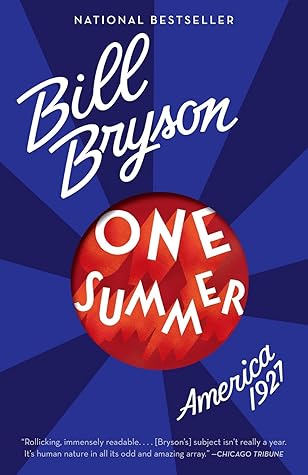More on this book
Community
Kindle Notes & Highlights
The nation’s inattentiveness notwithstanding, the Mississippi flood of 1927 was the most epic natural disaster in American history in extent, duration, and number of lives affected. The scale of economic loss was so large as to be essentially incalculable. Estimates ranged from $250 million to $1 billion. It wasn’t the most lethal catastrophe in American history, but it ruined more livelihoods and property than any other, and it lasted far longer.
Herbert Hoover lived to be ninety, and never in the whole of that time, so far as can be told, experienced anything approaching a moment’s real joy.
In six years, Hoover circled the globe five times. He lived through the Boxer Rebellion in China, hacked through the jungles of Borneo, rode camels across the red emptiness of Western Australia, rubbed shoulders with Wyatt Earp and Jack London in a Klondike saloon, camped beside the Great Pyramids of Egypt. He had experiences as rich and memorable as any young man has ever enjoyed, and was moved by none of them. In his memoirs, written toward the end of his life, Hoover rather testily acknowledges that he visited many marvelous places and saw many wondrous things as a young man, but then he
...more
Eight million Belgians were in real peril of starving. Hoover managed to find and distribute $1.8 million worth of food a week, every week, for two and a half years—2.5 million tons of it altogether—and to deliver it to people who would otherwise have gone unfed. The achievement can hardly be overstated. It was the greatest relief effort ever undertaken on earth, and it made him, deservedly, an international hero. By 1917, it was reckoned that Hoover had saved more lives than any other person in history.
Two things accounted for Hoover’s glorious reputation: he executed his duties with tireless efficiency and dispatch, and he made sure that no one anywhere was ever unaware of his accomplishments. Myron Herrick, America’s avuncular ambassador in Paris, performed similar heroic feats in occupied France without receiving any thanks from posterity, but only because he didn’t seek them. Hoover by contrast was meticulous in ensuring that every positive act associated with him was inflated to maximum importance and covered with a press release. In fact, Hoover was almost totally lacking in feeling
...more
To any newspaper, however small, that questioned or criticized his efforts, he wrote a personal letter of rebuke. Sometimes these ran on for several pages.
Worst of all by far was jazz, which was widely held to be a springboard for drug taking and promiscuity.
On one notable occasion, on September 26, 1926, in St. Louis, the Browns beat the Yankees 6–1 in just one hour and twelve minutes in the first game of a doubleheader, then came back and won the second game 6–2 in fifty-five minutes. These were both full nine-inning games. Quite how they managed it is a wonder. The two teams banged out 25 hits between them in the first game and 20 in the second, so these were hardly classic pitchers’ duels. There was just a lot less messing around.
Introduced to President Coolidge on a sweltering day at Griffith Stadium in Washington, Ruth wiped his face with a handkerchief and said, “Hot as hell, ain’t it, Prez?”
A moment of eerie stillness followed as it dawned on the watching throngs, most of whom had been standing in the hot sun for hours, that they were in the presence of two of the most taciturn men in America and that this ceremony was over.
Chicago was to corruption what Pittsburgh was to steel or Hollywood to motion pictures.
For Americans, there was also the gratifying novelty of coming first at something. It is a little hard to imagine now, but Americans in the 1920s had grown up in a world in which most of the most important things happened in Europe. Now suddenly America was dominant in nearly every field—in popular culture, finance and banking, military might, invention and technology. The center of gravity for the planet was moving to the other side of the world, and Charles Lindbergh’s flight somehow became the culminating expression of that.
An aide to President Roosevelt once confessed, “Practically the whole New Deal was extrapolated from programs that Hoover started.” But nothing could overcome his absence of lovability.


